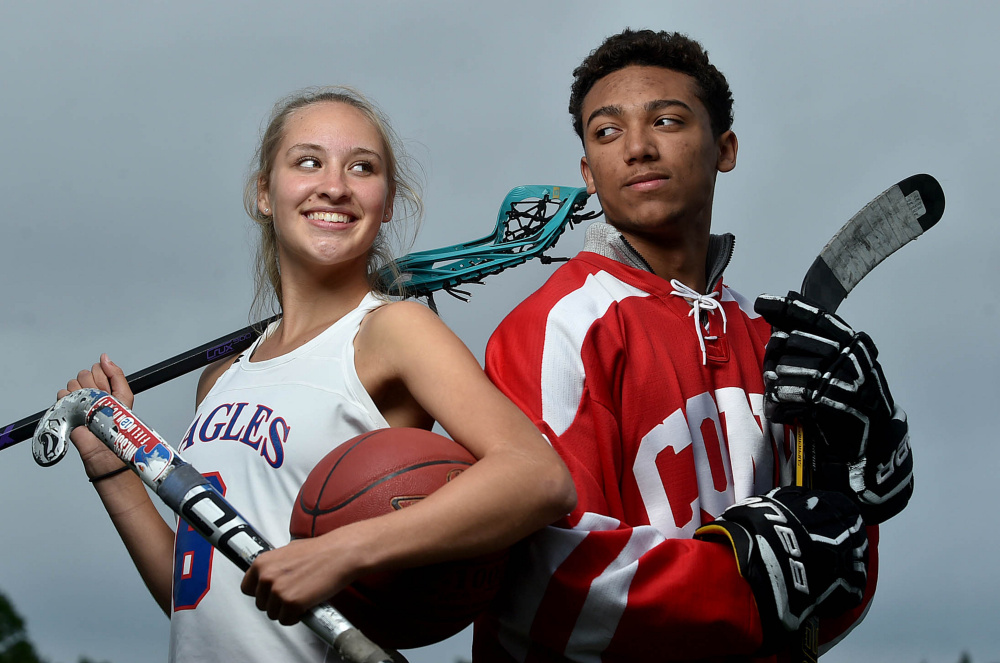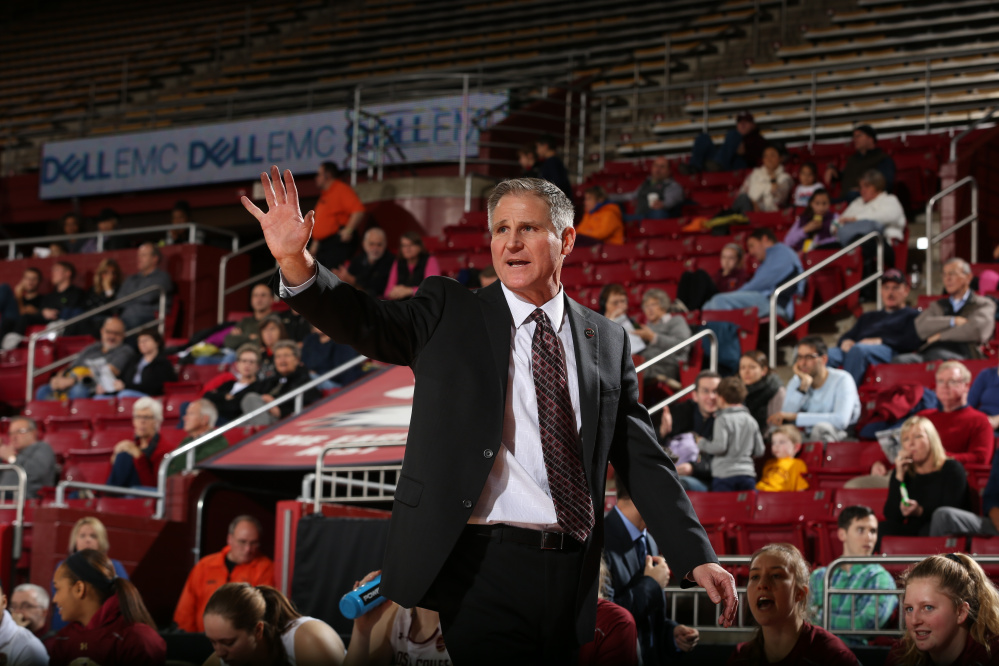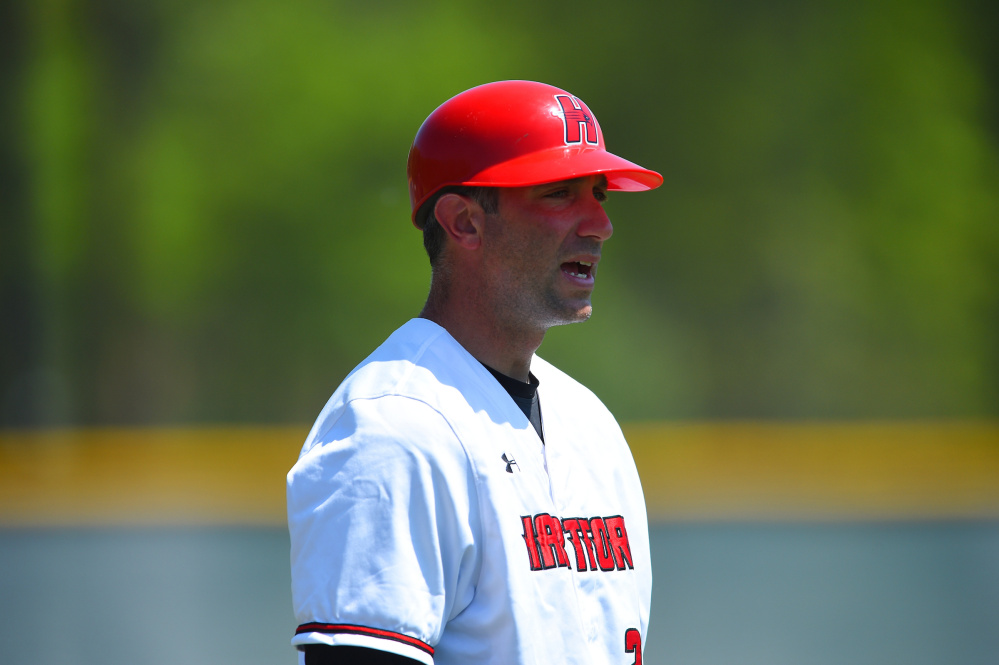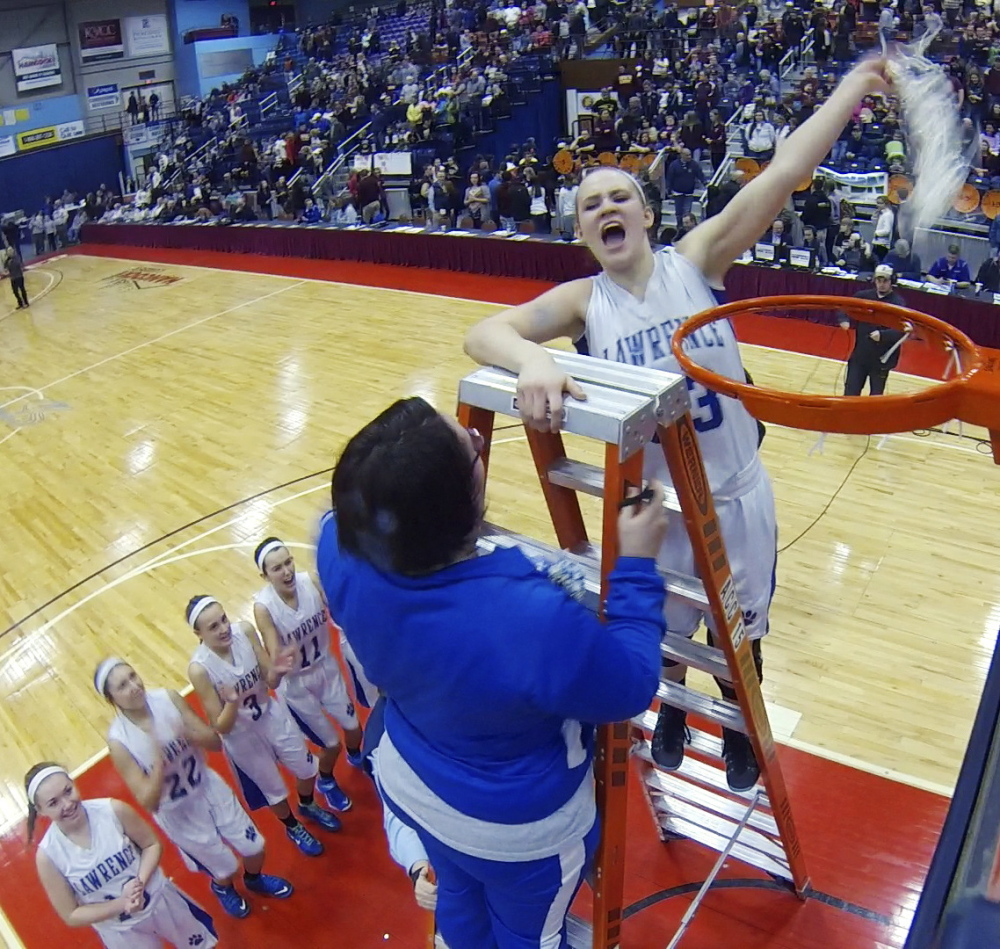The high school hockey season concludes in March. The same couldn’t be said about Cam Wilson’s.
Throughout his career, Wilson — who graduated from Cony in June — would say goodbye to the rest of the Rams and hello to his teammates with the Maine Moose, a junior hockey team with whom he played in postseason tournaments the next month.
A summer of training, showcase tournaments and the dawn of another Moose season in August followed, before a week or two of rest gave way to the high school season in November.
There are no other sports on the schedule. It’s all hockey all the time for Wilson, an example of a sports specialist — athletes who focus on just one sport.
“I’ve been in love with it,” said Wilson, who will play a post-grad year at Kents Hill. “I’ve skated since I was three and a half, and to keep going through this, you’ve got to be a little crazy about what you’re doing.”
Sports specialists find teams to play on outside of — or, in rare cases, in place of — the high school season, often signing up with club and travel teams and journeying throughout the region in order to develop their skills and display them against higher competition and in front of college coaches.
The specialization of high school athletes is a controversial issue and source of discussion in the sports community.
Athletes inevitably face a choice: What’s the best way to improve their chances at reaching an elite level in a sport? Is it to dedicate yourself to that sport and work as often as you can at it, or is it to play as many sports as you can and gain a boost to your overall athletic ability?
Proponents of specialization say there’s no better way for an athlete to develop his or her skills than by pursuing that sport throughout the year, and getting the experience against top competition and exposure in front of top college coaches that can go with it. Detractors point to potential red flags that year-round sports play raise, including increased injury risks, rising club fees and burnout possibilities, all the while wondering if specializing is truly the best way to build an elite athlete.
The numbers become scarce when detailing the prevalence of specializing in high school sports nationwide, let alone in this state, but school administrators acknowledge it’s become more prevalent.
“I think it has,” Skowhegan Area High School athletic director John Christopher said. “I think it’s more about the potential of a scholarship. … A lot of them go out of state, and they think they get more exposure than they would with their normal school team. And obviously, the more you play, the more opportunity there is for someone to get their eyes on you anyway.”
As club sports have taken off, offering athletes the sort of year-round chances to play a particular sport that didn’t exist a generation ago, the number of specializing athletes has been on the uptick as well. A recent NCAA survey of over 21,000 Division I, II and III athletes found that by the age of 12 more than 50 percent of Division I men’s hockey players — as well as Division I men’s and women’s soccer players and men’s tennis players — had specialized. The percentage is higher in Division I women’s tennis (75 percent) and Division I gymnastics (80 percent).
Chris Sementelli, a trainer and member of the Maine Principals’ Association Sports Medicine Committee, said it’s still more common to see athletes play multiple sports, in addition to one year-round, than it is to see true specialists. But school officials are seeing a growing trend. Deering High School athletic director Melanie Craig, for example, said specialization has “definitely” been on the rise.
“Over 10 years in athletic administration … that’s become more of a trend,” she said. “Before, when it was fall, you were in football season, you were in soccer season. Now you have to compete with outside travel basketball. … So now kids are put in a position where they’re making choices.”
FORMULA FOR A BETTER PLAYER
Nia Irving’s basketball career was flourishing. So the Lawrence High School star put away her field hockey stick and softball glove and took to the court full time.
Irving, 19, won two Miss Maine Basketball awards, and plays on a full-ride scholarship for Division I Boston University.
“I think it would help everybody,” the 2016 Lawrence graduate said of shifting to a one-sport focus, “because when you spend that much time on something to develop your skills, you’re going to see a payoff.”
Not everyone agrees. Sam Dexter was a baseball standout at Messalonskee. But he wasn’t about to drop football or hockey — he totaled 79 points in 22 games as a senior — in an effort to reap greater rewards in baseball.
Dexter, 23, a 2012 Messalonskee graduate, ended up playing at the University of Southern Maine and is now in the Chicago White Sox organization.
“From since I could walk until I stepped foot on campus at USM, I think playing multiple sports has been extremely beneficial for me,” he said. “Not even physically, but as a competitor and as a teammate.”
Irving and Dexter took different paths toward college athletics and both insist the ones they traveled got them to where they are today.
“I think back to two-a-days or doing conditioning in hockey, and I think about getting up for the 20th day in a row here, playing our 20th game in a row, and being mentally and physically drained,” Dexter said. “But I had those past experiences to get me through it.”
“I think along the lines of athleticism (playing multiple sports) helps a lot,” Irving added. “You can improve your foot skills, foot speed, stuff like that. But I don’t think it really necessarily improves your skill work with a specific sport. Throwing a softball isn’t going to help my ball-handling in basketball.”
Messalonskee multi-sport standout senior Ally Turner argues that she gained a sense of spatial awareness for lacrosse from her basketball background.
“I am 100 percent a believer that playing other sports makes you a better athlete, let alone a better player in your focused-on sport,” said Turner, who will play lacrosse for Division I Wagner College starting in 2018. “Playing basketball made me 10 times a better lacrosse player. … It translates to a lacrosse field where I see plays develop and I see the pass and I see open pockets.”
Specialists counter that investing in a sport year-round is the best way to develop that sport’s essential skills. And that without those skills being at an elite level, one’s overall athleticism becomes a moot point.
Maranacook junior Richard Down dropped baseball and basketball from his workload in middle school to specialize in soccer, which he plays for Seacoast United, a premier club based in Hampton, New Hampshire. Since then, he’s been invited twice to play on the club’s prestigious academy team. He says it isn’t a coincidence.
“If I didn’t specialize in soccer, I wouldn’t be as good as I am today,” he said. “If I’m not playing soccer for a while, I get rusty. But playing all the way around (the year) and not playing other sports is definitely better, in my opinion.”
GETTING NOTICED
Cony boys basketball coach T.J. Maines says athletes should play multiple sports but acknowledges that the specialists and full-year players hold a trump card.
“If you’re a scholarship-level basketball kid, college coaches aren’t up here watching Maine high school basketball,” said Maines, a former men’s basketball coach at Thomas College. “It’s the exposure. You have to go out to get seen.”
It’s not just true for basketball. Athletes join clubs like the Maineiax for lacrosse, Maine Majestix for field hockey and the Edge Academy for baseball and softball. Furthermore, Seacoast United director and coach Martyn Keen said that youth soccer has “exploded in recent years.”
“Most collegiate coaches will not come up to Maine to watch a high school game, just because the general standard is not particularly high,” he said. “On the club teams like we have, it’s been possible to actually make a splash on the national scene.”
Athletes join AAU teams, private clubs and academies with the goal of not just improving enough to impress a college coach, but getting that chance to be in front of one to begin with. In Maine, athletes go to the coaches, not the other way around. Even a three-sport athlete in Turner got Division I attention by playing lacrosse for the Maineiax and traveling to college showcases.
“If you live in central Maine and you just play high school and play (American) Legion, you’re not going to get the exposure where colleges can see you,” added graduated Messalonskee pitcher Josh Joy, who stopped playing football and basketball to focus on baseball and will now be pitching at Division II power Franklin Pierce University.
THE COLLEGE PERSPECTIVE
College coaches are seeing the trend. Motivated by big dreams, more athletes — in Maine and nationwide — are ditching versatility to go all-in on one sport.
“The college scholarship prospect has become a draw for kids,” University of Maine baseball coach Nick Derba said. “You see kids committing in seventh grade, where 10 years ago you probably didn’t see it very often.”
Some college coaches say versatile athletes are better equipped to handle playing at the next level.
“I’m always refreshed when I get a recruit who’s just an athlete,” Boston College women’s basketball coach Erik Johnson said. “They love playing tennis, they’re a kick-butt player on the soccer field, and when they get on the basketball court they just get after it.”
“I just think from the neuromuscular, physiological standpoint, (specializing is) not the best way to develop an athlete,” Colby men’s hockey coach Blaise MacDonald added. “The reactionary skills, the adaptability skills, the functional movement skills on the right side and left side, that’s hindered when you just do anything specialized.”
Still, coaches know their prospects need to play often. It’s a popular thought that 10,000 hours of play and practice will help an athlete master his or her craft. As a result, coaches want the athletes who will one day land on their rosters working hard and often at their chosen sport.
“From a skill perspective, the most skilled players are the ones that get in the gym and shoot every day, right?” Johnson said. “So I’m not above all of this. I live in a world where our athletes are clearly specialized from ages 18 to 22.”
The problem is when that focus kicks other sports out of the picture. Playing multiple sports increases athleticism and athletic potential, and while coaches care how good you are today, they’re more drawn by how good you can be tomorrow.
“We tend to think as recruiters that if you’ve got a player coming in that … played football or soccer or basketball or all three sports, that they have a higher ceiling than a kid who has been just playing baseball for the last two or three years,” University of Hartford baseball coach Justin Blood said. “You’re going to make improvements faster than a kid that plays multiple sports. But you’re also going to reach your ceiling.”
FOR THE LOVE OF THE GAME
While opinions vary on how an athlete should pursue a sport, the voices unite over one theme: Working exclusively to land a big college offer is a poor decision. The odds, Maines and Blood said, are just too small.
“If you’re good at something and you have a passion for it, play extra,” Maines said. “If you feel good about it, your parents can afford it and it makes sense in your life, then it’s a great thing to try to do. But you shouldn’t be doing it for that college opportunity. … For most kids, it’s not going to be feasible.”
The logic doesn’t always sink in for specializing athletes, however. Or their families.
“One of the biggest reasons is the parents are probably pushing for it,” said Ryan Copp, the program director at the Edge Academy. “I think there are a lot of parents out there with big hopes and dreams for their kids.”
For many athletes across the sports spectrum, however, it isn’t an issue. Their interest in the game is what drives them to invest everything they can into it, and though their aspirations climb in the meantime, they aren’t the biggest reason they put up with the travel, fees, grind and sacrifices a year’s worth of playing a sport can demand.
“I’ve never had a doubt in my mind that this is what I want to do and that this is what I’m all about,” said Wilson, the former Cony hockey standout. “Some of my best friends and some of the best memories I have are because I chose to focus on this sport year-round. … I really don’t have any regrets.”
Drew Bonifant — 621-5638
dbonifant@centralmaine.com
Twitter: @dbonifantMTM
Send questions/comments to the editors.








Comments are no longer available on this story